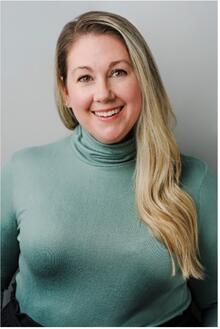 Accessibility means being inclusive when we design events, workshops, courses, products and services.
Accessibility means being inclusive when we design events, workshops, courses, products and services.
Melissa Potwarka, a doctoral candidate in the School of Public Health Sciences, understands the importance of designing for inclusion. Seeing a connection between inclusion and well-being, Potwarka's PhD research focuses on how the universal design for learning (UDL) framework can support the well-being of students and instructors.
"I think that what makes universal design for learning kind of unique in the context of well-being is that it calls for the use of flexible and multiple learning strategies that centre around the needs of all students," Potwarka says. "It offers instructors strategies that confront systemic issues that often disadvantage individuals with disabilities or other equity-deserving identities while fostering learning environments that are responsive to our diverse student body.".
Supervised by Dr. Kelly Skinner, Potwarka's research is funded by a SSHRC Insight Development Grant. As Potwarka suggests, researching UDL and well-being is timely.
"There's so much we learned in the pandemic that actually made learning easier and more accessible, which, of course, indirectly and directly impacts well-being. And so, some of the rush that we experience and feel to get back to pre-pandemic life and teaching means that we're losing sight of many of these positives that we learned in the pandemic, and I don't think we can afford to do this."
Accessibility Tip: Identify where you can provide flexibility and choice, and where limitations exist. One size rarely fits all in any situation that requires interactions, and offering at least one alternate format allows individuals to select what works best for them. For more on universal design strategies, visit the Centre for Teaching Excellent Teaching resource What is Universal Design?
Potwarka points out that higher education is at a critical point for teaching, learning and well-being.
"I feel like many of our instructors and students need help right now," she observes.
Potwarka was inspired by Waterloo professor Dr. Jay Dolmage's book, Academic Ableism. Motivated by Dolmage's caution against over-simplifying UDL through checklists, Potwarka has advocated for a whole-systems, collaborative approach to learning about UDL and well-being through the development of a community of practice.
A community of practice is a formal or informal group of practitioners who come together to learn and share ideas on the development of skills and knowledge.
While Potwarka recognizes that parts of UDL require addressing broader, systemic issues within higher education institutions, she emphasizes that simple actions have the potential for great impact. For instructors, this can mean something as simple as striving to make office hours feel more approachable.
"Whenever you can infuse humanity and connection into your learning and into your work with genuine care and support, I think the better off we will all be."






